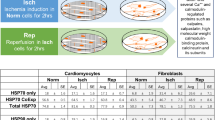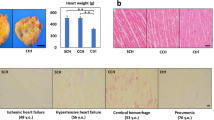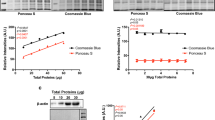Abstract
As proteins are the ultimate biological determinants of phenotype of disease, we screened altered proteins associated with heart failure due to arrhythmogenic right ventricular cardiomyopathy (ARVC) to identify biomarkers potential for rapid diagnosis of heart failure. By 2-dimensional gel electrophoresis and mass spectrometry, we identified five commonly altered proteins with more than 1.5 fold changes in eight ARVC failing hearts using eight non-failing hearts as reference. Noticeably, one of the altered proteins, heat shock protein 70 (HSP70), was increased by 1.64 fold in ARVC failing hearts compared with non-failing hearts. The increase of cardiac HSP70 was further validated by Western blot, immunochemistry, and enzyme-linked immunosorbent assay (ELISA) in failing hearts due to not only ARVC, but also dilated (DCM, n = 18) and ischemic cardiomyopathy (ICM, n = 8). Serum HSP70 was also observed to be significantly increased in heart failure patients derived from the three forms of cardiomyopathies. In addition, we observed hypoxia/serum depletion stimulation induced significantly elevation of intracellular and extracellular HSP70 in cultured neonatal rat cardiomyocytes. For the first time to our knowledge, we revealed and clearly demonstrated significant up-regulation of cardiac and serum HSP70 in ARVC heart failure patients. Our results indicate that elevated HSP70 is the common feature of heart failure due to ARVC, DCM, and ICM, which suggests that HSP70 may be used as a biomarker for the presence of heart failure due to cardiomyopathies of different etiologies and may hold diagnostic/prognostic potential in clinical practice.





Similar content being viewed by others
References
McGregor E, Dunn MJ (2003) Proteomics of heart disease. Human Mol Genet 12:R135–R144. doi:10.1093/hmg/ddg278
Shailja V, Parikh SV, De Lemos JA (2006) Biomarkers in cardiovascular disease: integrating pathophysiology into clinical practice. Am J Med Sci 332:186–197
Basso C, Corrado D, Marcus FI, Nava A, Thiene G (2009) Arrhythmogenic right ventricular cardiomyopathy. Lancet 373:1289–1300
Barrans JD, Allen PD, Stamatiou D, Dzau VJ, Liew CC (2002) Global gene expression profiling of end-stage dilated cardiomyopathy using a human cardiovascular-based cDNA microarray. Am J Pathol 160:2035–2043
Genth-Zotz S, Bolger AP, Kalra PR, von Haehling S, Doehner W, Coats AJ (2004) Heat shock protein 70 in patients with chronic heart failure: relation to disease severity and survival. Int J Cardiol 96:397–401. doi:10.1016/j.ijcard.2003.08.008
Knowlton AA, Kapadia S, Torre-Amione G, Durand JB, Bies R, Young J, Mann DL (1998) Differential expression of heat shock proteins in normal and failing human hearts. J Mol Cell Cardiol 30:811–818. doi:10.1006/jmcc.1998.0646
Zhu J, Quyyumi AA, Wu H, Csako G, Rott D, Zalles-Ganley A, Ogunmakinwa J, Halcox J, Epstein SE (2003) Increased serum levels of heat shock protein 70 are associated with low risk of coronary artery disease. Arterioscler Thromb Vasc Biol 23:1055–1059. doi:10.1161/01.ATV.0000074899.60898.FD
Corbett JM, Why HJ, Wheeler CH, Richardson PJ, Archard LC, Yacoub MH, Dunn MJ (1998) Cardiac protein abnormalities in dilated cardiomyopathy detected by two-dimensional polyacrylamide gel electrophoresis. Electrophoresis 19:2031–2042. doi:10.1002/elps.1150191123
Heinke MY, Wheeler CH, Chang D, Einstein R, Drake-Holland A, Dunn MJ, dos Remedios CG (1998) Protein changes observed in pacing-induced heart failure using two-dimensional electrophoresis. Electrophoresis 19:2021–2030. doi:10.1002/elps.1150191122
Arab S, Gramolini AO, Ping P, Kislinger T, Stanley B, van Eyk J, Ouzounian M, MacLennan DH, Emili A, Liu PP (2006) Cardiovascular proteomics: tools to develop novel biomarkers and potential applications. J Am Coll Cardiol 48:1733–1741. doi:10.1016/j.jacc.2006.06.063
Neglia D, Michelassi C, Trivieri MG, Sambuceti G, Giorgetti A, Pratali L, Gallopin M, Salvadori P, Sorace O, Carpeggiani C, Poddighe R, L’Abbate A, Parodi O (2002) Prognostic role of myocardial blood flow impairment in idiopathic left ventricular dysfunction. Circulation 105:186–193. doi:10.1161/hc0202.102119
Vasan RS (2006) Biomarkers of cardiovascular disease: molecular basis and practical considerations. Circulation 113:2335–2362. doi:10.1161/CIRCULATIONAHA.104.482570
Dybdahl B, Slørdahl SA, Waage A, Kierulf P, Espevik T, Sundan A (2005) Myocardial ischemia and the inflammatory response: release of heat shock protein 70 after myocardial infarction. Heart 91:299–304. doi:10.1136/hrt.2003.028092
Lainscak M, von Haehling S, Anker SD (2009) Natriuretic peptides and other biomarkers in chronic heart failure: from BNP, NT-proBNP, and MR-proANP to routine biochemical markers. Int J Cardiol 132:303–311. doi:10.1016/j.ijcard.2008.11.149
Boheler KR, Volkova M, Morrell C, Garg R, Zhu Y, Margulies K, Seymour AM, Lakatta EG (2003) Sex- and age-dependent human transcriptome variability: implications for chronic heart failure. Proc Natl Acad Sci USA 100:2754–2759. doi:10.1073/pnas.0436564100
Yung CK, Halperin VL, Tomaselli GF, Winslow RL (2004) Gene expression profiles in end-stage human idiopathic dilated cardiomyopathy: altered expression of apoptotic and cytoskeletal genes. Genomics 83:281–297. doi:10.1016/j.ygeno.2003.08.007
Kawana K, Miyamoto Y, Tanonaka K, Han-no Y, Yoshida H, Takahashi M, Takeo S (2000) Cytoprotective mechanism of heat shock protein 70 against hypoxia/reoxygenation injury. J Mol Cell Cardiol 32:2229–2237. doi:10.1006/jmcc.2000.1250
Sen-Chowdhry S, Syrris P, Ward D, Asimaki A, Sevdalis E, McKenna WJ (2007) Clinical and genetic characterization of families with arrhythmogenic right ventricular dysplasia/cardiomyopathy provides novel insights into patterns of disease expression. Circulation 115:1710–1720. doi:10.1161/CIRCULATIONAHA.106.660241
Page B, Young R, Iyer V, Suzuki G, Lis M, Patel Korotchkina L, MS Blumenthal KM, Fallavollita JA, Canty JM (2008) Persistent regional downregulation in mitochondrial enzymes and upregulation of stress proteins in swine with chronic hibernating myocardium. Circ Res 102:103–112. doi:10.1161/CIRCRESAHA.107.155895
Wei YJ, Huang YX, Zhang XL, Li J, Huang J, Zhang H, Hu SS (2008) Apolipoprotein D as a novel marker in human end-stage heart failure: a preliminary study. Biomarkers 13:535–548. doi:10.1080/13547500802030363
Crowther JR (1995) ELISA: theory and practice. Methods Mol Biol 42:1–223
Jeyaseelan R, Poizat C, Bakeri RK, Abdishoo S, Isterabadi LB, Lyonsi GE, Kedes L (1997) A novel cardiac-restricted target for doxorubicin. J Biol Chem 272:22800–22808
Zhu W, Chen J, Cong X, Hu S, Chen X (2006) Hypoxia and serum deprivation-induced apoptosis in mesenchymal stem cells. Stem Cells 24:416–425. doi:10.1634/stemcells.2005-0121
Acknowledgments
This study was funded by the National ‘863’ Program (2006AA02Z4B8, Y.J.Wei) and the National Changjiang Scholar and Innovation Group Program (2008, S·S.Hu)
Author information
Authors and Affiliations
Corresponding authors
Electronic supplementary material
Below is the link to the electronic supplementary material.
Rights and permissions
About this article
Cite this article
Wei, YJ., Huang, YX., Shen, Y. et al. Proteomic analysis reveals significant elevation of heat shock protein 70 in patients with chronic heart failure due to arrhythmogenic right ventricular cardiomyopathy. Mol Cell Biochem 332, 103–111 (2009). https://doi.org/10.1007/s11010-009-0179-1
Received:
Accepted:
Published:
Issue Date:
DOI: https://doi.org/10.1007/s11010-009-0179-1




